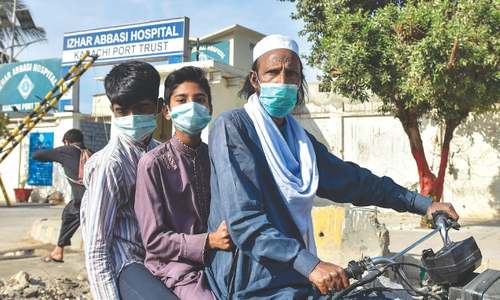KARACHI: Confusion still prevails over the Keamari incident on Wednesday as authorities are waiting for reports of a forensic probe as well as chemical examinations to ascertain the exact cause of the mysterious incident that officials said claimed lives of 10 people.
While a report of Karachi University’s International Centre for Chemical and Biological Sciences (ICCBS) suspected that ‘soya bean dust (aeroallergens)’ may have caused the deaths, Karachi Commissioner Iftikhar Shallwani said the option of hiring services of international bodies and foreign experts was open if the mystery was not resolved locally.
“More crucial inputs like findings of chemical and forensic examinations would help ascertain the nature of the poisonous substance,” Mr Shallwani told Dawn. “The findings of the University of Karachi did help connect dots in the procedure. This led to the decision to remove a ship from Karachi port and it gradually reduced the intensity of the toxic gas in the air.”
When asked about the agencies which were conducting the forensic probe and chemical examinations, he said the job was handed over to the department concerned and the process included autopsy reports.
Commissioner says total 10 people died and 300 sickened in the incident
Police Surgeon Qarar Ahmed Abbasi told Dawn that autopsies were performed on two bodies at the Dr Ruth Pfau Civil Hospital Karachi on Tuesday and samples were also collected from 15 affected persons by a team of medico-legal officers during a visit to hospitals concerned. He said that the samples were sent to chemical examiner for ascertaining exact cause of death and sickness.
The commissioner claimed that total 10 persons, and not 14, died in two days in the Keamari incident. “We counted each and every deceased and collected data of every individual so there should not be a misunderstanding on the number of deaths.”
Life returning to normal in Keamari
Commercial activities resumed in Keamari, including the most affected Jackson Market adjacent to the port, that had been in the grip of fear and panic for the past three days.
Educational institutions in the locality also opened after a gap of two days. However, people were still seen adopting precautionary measures as they continued to wear masks.
A senior police officer said that things were subsiding now since unloading from a vessel containing soybean had been halted.
“Air quality is improving in Keamari, though I don’t have the specific data with me right now,” an official of Global Environmental Laboratory, which had conducted air quality monitoring survey on behalf of the Sindh Environmental Protection Agency, said.
A statement issued by the office of the commissioner said that the condition of Keamari and adjoining areas remained under control as no death and sickness cases was reported on Wednesday.
It said 35 minor cases of eye itching, abnormal breathing etc were reported. They were given first aid and there was no need to admit them to hospital.
“From the inception of the gas leakage incident at Keamari, 10 persons have so far reported dead and 300 persons were admitted to different hospitals for their treatment,” it said.
The commissioner office statement pointed out that the ICCBS report found “the availability of aeroallergen from soya bean dust in blood samples collected from people who died after suspected gas leakage in the city’s Keamari area”.
The report further stated that a similar incident had also been experienced in Spain two years ago.
Why soybean dust did not affect port workers?
However, medical and plant protection experts challenged the ICCBS findings.
Speaking on the condition of anonymity, an expert of plant protection department questioned if the soybean dust caused deaths and illness, why it did not affect 369 workers involved in offloading of the consignment at the port and the ship crew.
“We have no history of such an incident. The plant protection department had also carried out sampling at the site and found zero level of concentrated fumigants,” he said.
Dr Nadeem Rizvi, former head of the Jinnah Postgraduate Medical Centre’s chest department, said: “This kind of dust allergies rarely cause immediate death. I think an examination of blood samples was not sufficient to reach conclusive findings in this case and experts should have also analysed post-mortem reports of the victims as well as carry out air quality sampling.”
He said a blood analysis of regular port workers should be carried out which would likely reveal higher levels of traces of grain dust as comparatively they were more exposed to grains.
To a question why the soybean dust didn’t affect port workers, ICCBS director Dr Iqbal Choudhary said: “We don’t really know where the victims, whose blood and urine samples were tested, worked or lived. We found higher levels of immunoglobulin E (IgE) in the samples, a type of antibodies normally found in small amounts in the blood but their higher levels can be a sign that the body has overreacted to allergens.”
Researchers at the ICCBS, he said, also studied signs and symptoms of patients and the relevant international literature which showed a link between soybean dust allergens and the patients.
To another question, he said there were no traces of chemical contaminants in the blood samples and that the report was preliminary. —Faiza Ilyas, Imtiaz Ali & Imran Ayub contributed to this report
Published in Dawn, February 20th, 2020














































